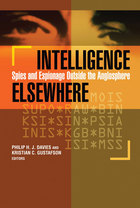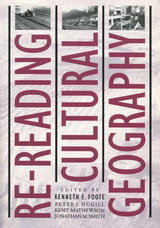
Spying, the “world’s second oldest profession,” is hardly limited to the traditional great power countries. Intelligence Elsewhere, nevertheless, is the first scholarly volume to deal exclusively with the comparative study of national intelligence outside of the anglosphere and European mainstream. Past studies of intelligence and counterintelligence have tended to focus on countries such as the United States, Great Britain, and Russia, as well as, to a lesser extent, Canada, Australia, France, and Germany. This volume examines the deep historical and cultural origins of intelligence in several countries of critical importance today: India, China, the Arab world, and indeed, Russia, the latter examined from a fresh perspective. The authors then delve into modern intelligence practice in countries with organizations significantly different from the mainstream: Iran, Pakistan, Japan, Finland, Sweden, Indonesia, Argentina, and Ghana.
With contributions by leading intelligence experts for each country, the chapters give the reader important insights into intelligence culture, current practice, and security sector reform. As the world morphs into an increasingly multi-polar system, it is more important than ever to understand the national intelligence systems of rising powers and regional powers that differ significantly from those of the US, its NATO allies, and its traditional opponents. This fascinating book shines new light into intelligence practices in regions that, until now, have eluded our understanding.

Identifying “lessons learned” is not new—the military has been doing it for decades. However, members of the worldwide intelligence community have been slow to extract wider lessons gathered from the past and apply them to contemporary challenges. Learning from the Secret Past is a collection of ten carefully selected cases from post-World War II British intelligence history. Some of the cases include the Malayan Emergency, the Cuban Missile Crisis, Northern Ireland, and the lead up to the Iraq War. Each case, accompanied by authentic documents, illuminates important lessons that today's intelligence officers and policymakers—in Britain and elsewhere—should heed.
Written by former and current intelligence officers, high-ranking government officials, and scholars, the case studies in this book detail intelligence successes and failures, discuss effective structuring of the intelligence community, examine the effective use of intelligence in counterinsurgency, explore the ethical dilemmas and practical gains of interrogation, and highlight the value of human intelligence and the dangers of the politicization of intelligence. The lessons learned from this book stress the value of past experience and point the way toward running effective intelligence agencies in a democratic society.
Scholars and professionals worldwide who specialize in intelligence, defense and security studies, and international relations will find this book to be extremely valuable.

The geography of culture has held a sustained attraction for some of the most distinguished and promising geographers of the twentieth century. These notable voices have now been brought together to explore the cultural landscape in this fresh, encompassing survey of one of geography's most vital research areas.
In Re-reading Cultural Geography, a worthy successor to the original and now classic Readings in Cultural Geography (1962), the editors have gathered articles, essays, and new commentaries, as well as extensive annotated reading lists and a comprehensive bibliography, into a book that will be ideal for undergraduate and graduate courses of all levels.
Assessing an intellectual world far different from the one defined in the earlier volume, Re-reading Cultural Geography uncovers the common themes of a vibrant, often clamorous discipline. Broadly defined, these include "how the world looks"—the patternings of cultural traits and material artifacts; "how the world works"—the dynamics of human organizations in interaction with the environment; and "what the world means"—the systems of shared values and beliefs that shape communities.

This selection of Peter Trudgill's major works since 1988, appearing here in updated and revised form, reveals major recurring themes in his work on linguistic diversity. This book evinces his deep concern that the world's linguistic diversity is diminishing at an alarming rate. The linguistic future is likely to be very different from the past, because increased language contact among peoples will result in the creation of fewer new languages to balance the language deaths. The essays here manifest Trudgill's conviction that linguists must make every effort to study minority languages and dialects before they vanish. The book also demonstrates his sense of the obligation that linguists have to educate the public about why linguistic diversity is valuable.
The book deals with a number of specific but related topics. One area is the role of English in the world, and the nature of Standard English or Englishes. Another is language as a human issue, reflecting the author's concern that the results of sociolinguistic research should be made available to assist, wherever possible, with the solution of educational and other real-world problems. A third focus is on the problematic and interconnected relationships among nation and language and dialect, but, unlike the work of most other writers in this field, this book looks closely at the linguistic characteristics of the varieties concerned. The final major emphasis is on sociohistorical linguistics: in particular, the relationship between colonial and motherland varieties of English; dialect contact and language contact; and the sociolinguistically informed dialectology of linguistic theory, linguistic description, and the applications of linguistics. The major overall unifying theme of the book is linguistic variation and, as the diachronic outcome of linguistic variation, linguistic change.
READERS
Browse our collection.
PUBLISHERS
See BiblioVault's publisher services.
STUDENT SERVICES
Files for college accessibility offices.
UChicago Accessibility Resources
home | accessibility | search | about | contact us
BiblioVault ® 2001 - 2024
The University of Chicago Press









